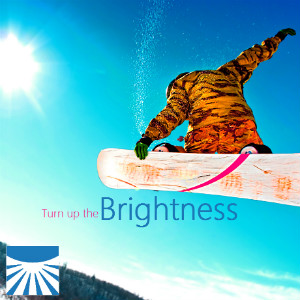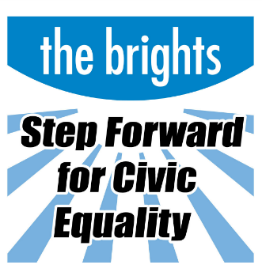The Brights' Bulletin
< Previous Issue | Next Issue >
Issue #115
(Note that links in archived Bulletin issues may no longer be valid.)
BRIGHTS BULLETIN -- DECEMBER 2012
|
Insights from Brights The new blog site is almost ready to go. You’ll receive an announcement within the week. Get ready for the first couple of bloggers to weigh in when the site goes live. “A Rational Woman” and that “Umwelt Utahpia” fellow will be first to speak from their individual perspectives, naturalistic, of course. Proposals from both were harmonious with the stated intent of this newly available communications channel. Their writing samples showed some likely knack for the task. So, please see what they have to say, and, if you deem it worth others having a look, you can spread the word in social media. Oh yes, also don’t forget to put in your own two cents! |
| Back to top |
|
To “Brighten” with Gift Gifting
This is the season in which your online shopping for gifts can really benefit the Brights movement if you link your online shopping to The Brights’ Net. Each purchase you make can spur a small donation to the Brights at no extra cost to you. Do your friends know? Anyone who indicates they favor civic parity for citizens who have a naturalistic worldview may want to channel their support in this way. Amazon: Buying books (or anything) earns up small commission for the Brights movement if the shopping at Amazon.com (or .uk, .de, .fr) starts via a link at the website. Even easier, a link to a URL specific to Amazon.com: http://www.amazon.com/?tag=thebrighnet-20 iGive: This is a route to over 1200 different online businesses! For example, there are over 70 starting with “A” (like: Air France, Ace Hardware, Adidas, Ann Taylor, Anne Klein, A Pea in the Pod, Apple Store, Asian Ideas, AT&T, Auto Parts Giant, Avon). You first install an iGive.com link to use that site, designating The Brights’ Net as your nonprofit recipient. It’s just a small percentage commission (amount varies by merchant), but we appreciate all that trickles in from this pathway. (Even installing the link earns a one-time bonus for the Brights.) One needn’t shop to support, of course. In the season of end-of-year giving, you can direct your charitable generosity more directly to the educational efforts of The Brights’ Network to elevate the naturalistic worldview. Even $5 per month ongoing (via PayPal) is of enormous help to the resource planning. |
| Back to top |
|
International Brights’ Forum Report This month, the Forum community has discussed many noteworthy subjects. Of particular civic interest, see the case of an Oklahoma, USA, criminal defendant sentenced to church attendance as part of a plea agreement. Should the Court be allowed to include religious observance in the terms, or is this a dangerous incursion into matters of personal belief? Also of civic interest, "intelligent design" theory is on trial in this topic, featuring the first-person account of a lecturer on the Philosophy of Science. Why not weigh in on matters of importance where you live? Registration is simple and takes just minutes. See you there! |
| Back to top |
|
Government Tightens Rules for Science Teaching (UK) Many recently opened schools in Britain are independently run by religious or charitable organizations or parent groups. These “free schools” do not have to abide by the national curriculum despite drawing central government funding. Scientists have had concerns that such schools, if run by creationists, would either avoid teaching evolution in science or teach it in only a perfunctory way. Students would not recognize evolution as being so extensively evidenced and so essential to comprehending modern biology. Last week the BBC reported that new government rules for 2013 will compel the free schools to teach evolution as “a comprehensive and coherent scientific theory” in their science classes or the Department of Education will take “swift action” which could cause them to lose state funding. |
| Back to top |
|
Taking Charge of Change -- Youth (Ireland) The nation’s president hosted a series of seminars and workshops geared to gathering the vision and views of young people (ages 17-26) and, with aid of researchers from the Dublin Institute of Technology, reported that the theme of “equality” was one of the most prominent in both submissions and in the regional workshops. “Young people have a deep desire to contribute to politics and society and are seeking to develop both a culture of civic participation and structures that support its implementation.” There was a sense that more needs to be done to encourage citizens to become active and engaged both in politics and in civil society. The need for involvement in politics and civil society is hardly confined to Ireland, or to youth. Much the same applies to similarly involving more citizens who hold a naturalistic worldview, whether youth or older. Change necessitates involvement. |
| Back to top |
|
“Holiday Celebrations” It is common for Brights to encounter more than one “December dilemma” involving how they relate to seasonal situations, and to inquire of Brights Central how best to “fit” their naturalistic worldview to certain circumstances. Here’s a good example drawn from this past week’s in-box at BC: (28 November email has “Holiday Celebrations” in subject line): “What would you suggest to share with my preschooler's class? How to make a snowman comes to mind, but we're in California... Recommendations appreciated!” The parental quandary was occasioned by her preschooler’s teacher having invited parents to identify the “holiday you would like to share” and “what you are interested in doing with the class.” Christmas, Hanukkah, Kwanzaa and Three Kings Day were given as examples, with possibilities to plan “a traditional activity” to do with the children, share “a traditional food,” or just come to “talk with us.” The note closed with: “I look forward to hearing about your holiday traditions!” BC offered one suggestion to the parent, but yours may well be better! You may email your recommendation to the-brights@the-brights.net with “PRE-SCHOOL” in your subject line. We will compile a list and convey, but without your name. |
| Back to top |
|
Our “Best Tradition” – A Potential Toolbox Topic? The Toolbox site segment passes along advice to those who have a naturalistic worldview but live in communities where supernatural beliefs prevail. For some Brights, “diversity” describes their cultural and religious milieu. For others, “hegemony” is the more accurate situation. Whatever the case, there are among us Brights who easily adapt “old traditions” or invent new ones to carry forward each year. Are you among the Brights who have a knack at handling the holidays? Perhaps your family has a ritual or custom that you think others might like to adopt. If so, we would welcome your brief written contribution. Given that we obtain sufficient diversity in responses from constituents, we will be glad to publish another Toolbox segment that will be available to other families. For consistency, please reply to this question: What meaningful tradition/ritual/custom do you deem worth celebrating annually in the December season? Describe your “beneficial tradition” in 150 words or less, and email to the-brights@the-brights.net with TOOLBOX in uppercase letters in your subject line. Thank you for offering ideas that can perhaps aid other Brights as they deal with future December situations. |
| Back to top |
|
Age of Earth, One of the Great Mysteries? (USA)
In the United States, a politician can sidestep a straightforward question (How old do you think the earth is?) with this evasion (I'm not a scientist). That sort of dodge usually draws neither notice nor surprise. But not always. Many an American politician considers “ducking the question” a better path to elective leadership – better than answering one way (creationist view) or the other (accepted scientific understanding). But isn’t this something of an indictment of the position of science in the broader culture? Anything you wish to do about it? Letters? Emails? Calls? If you don’t like such fudging, you can say so and advance to political leaders that one needn’t “be a scientist” to credit scientific knowledge for what it is. |
| Back to top |
|
Another Blogging Bright? At BC, we’re starting to rather like that we had to abandon the new blog site’s original title (“BrightenUp!”) due to trademark issues. “Blogging Brights” seems a better name to show the individuality of any Brights who will use the new avenue to put out their thoughts. We look to add a few more contributors from the constituency as time goes on. If you always have lots worthwhile things to say, write well, and can ground your opinion in evidence, then you may want to try your hand in blogging from this site. There is a process whereby you can, if you wish, seek to have a spot of your own. |
| Back to top |
|
A Personal Note… …to those of you who, having noted in last month’s bulletin that I was facing breast cancer treatment, sent along your best wishes for speedy recovery: I have been gradually gaining strength and am almost back to feeling good. The month of November 2012 was definitely not at all my favorite ever in life, especially since I was grabbed by a virus last week! Things are looking very good with regards to the cancer treatment, though! Whew! Thanks again! I certainly have appreciated receiving your caring sentiments, including cards, poems, and even music! — Mynga |
| Back to top |
|
Research |
|
Progressing to Parity Here’s the concept of civic parity as expressed in the vision of The Brights’ Network (emphasis added): Persons who have a naturalistic worldview should be accepted as fellow citizens and be full participants in the cultural and political landscape of their society. Princeton professor Tali Mendelberg and Christopher Karpowitz at Brigham Young University are concerned with a different egalitarian vision. In keeping with general research interest in political influence of minorities, some recent work has focused on factors in empowerment of women. It wasn't about brights, but one wonders if their work on political parity for women in leadership might bear at least some degree of relevance to the challenges we face. The report drew interest at BC because it touched (albeit only tangentially) on one of the challenges we have in progressing to full civic participation. The issue? -- the very low representation of brights in the decision-making bodies of so many of our democratic societies, despite a larger representation in the society at large. Women’s Influence in Groups The researchers in this case were studying women’s participation in political decision-making. They were thinking about what goes on in settings like committees and caucuses, where the issues of likely concern to women (e.g., vulnerable populations) could be addressed by advocacy and voting. Their studies of gender dynamics in small groups (tolerance of rude interruptions, measures of time to speak, etc.) indicate that the gender ratios in a deciding body matter. As the researchers concluded: "Our research shows that female lawmakers significantly reshape policies only when they have true parity with men." Small minority female representation is accompanied by reluctance to strongly advocate policy preferences within the group ("lawmaking body"). A shift in functional influence (toward women’s empowerment) takes place only when the representation becomes high enough. In a study where female composition of a group was zero, 20, 40, 60, 80, or 100% of participants, it was not until women made up at least 60% of the lawmaking body that they began to be viewed (and perceive themselves) as other than quiescent and ineffective. Clearly diminished when in groups operating by majority rule, the women did somewhat better at addressing their concerns when voting was by consensus. (There, female minorities were able to achieve greater voice). The researchers note that they weren’t examining the impact of female executives, but that of women in bodies much like legislatures, city councils and school boards. In those settings, when there are more women participants, the women speak more and men listen more to their matters of concern. When it comes to civic empowerment, numbers count. The researchers saw the challenge as one of electing “vastly more women” for female influence to be felt and heeded. Brights' Influence in Society On that score, there’s a long way to go. How can we gain the civic influence to change matters (of general concern to brights) for the better? More specifically, how can we empower the many individuals who have a naturalistic worldview within the places where key societal choices and political decisions are made? The settings of school boards and local councils, to say nothing of legislative bodies at higher levels, are settings highly relevant to our own needs as citizens who have a naturalistic worldview. And from whence comes real policy influence for those who have a naturalistic worldview? How do Brights garner influence when living in the midst of supers? It is in the legislatures, the city councils and county commissions, and on the school boards that so many key decisions affecting democratic societies are being made. Greater representation by brights (all stripes) is crucial.
Although elective parity for citizens who have a naturalistic worldview may be a long way off in many nations, and impossible to achieve in others, there is a case to be made that a start can be made. If there is ever to be the circumstance of effective advocacy and policy change, there must be vastly more physical presence in these bodies. What about you? |
| Back to top |




